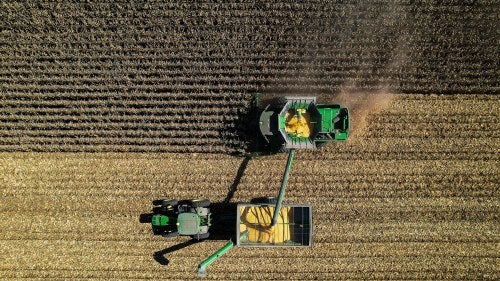Why are foreign investors buying land in Illinois, and what does it mean for the state?

In Illinois, Chinese investors own only about one square mile of land, while Portuguese, Italian, and Canadian interests hold over 760 square miles combined.
Foreign investors own, or partly own, about a third of the land in central Illinois’ McLean County. In neighboring DeWitt County, foreign investors hold about 20% of the county’s land, as well as about 10% in Logan and Ford counties.
A recent wave of foreign investment in Midwestern farmland has kicked off a flurry of legislation in Springfield and Washington. In Illinois, there are multiple bills in both the state House and Senate that would restrict some foreign entities from purchasing agricultural land – some of which specifically bar the Chinese Communist Party or Chinese businesses.
ChicagoGlobal’s analysis of foreign land acquisitions reported to the U.S. Department of Agriculture found that Chinese investors own less than one square mile of land in Illinois, while Portuguese, Italian, and Canadian interests own over 760 square miles combined. Most of these foreign investments were made by individuals or businesses, as it’s very rare for foreign governments to buy U.S. land outright.
It’s hard to visualize how big Illinois’ 795,000 acres of foreign-held land really is, but Michigan State University professor of economics David Ortega, who recently testified on foreign land ownership before the U.S. Senate, puts it in context like this:
“The state has more than 29 million acres of privately held agricultural land, so we are only talking of 2.7% of that land being foreign-held,” Ortega told ChicagoGlobal. Nationwide, about 3.1% of the country’s privately held agricultural land is fully or partly foreign-owned.
“I would say it does not represent a sizable portion of total agricultural land in the state,” he added, while also pointing out that there was also a decrease in foreign-held land in the state in 2022.
That drop came after foreign investment in Illinois crop land surged in 2020. But the first spike in international investors came in 2009. Foreign investment in Illinois’s land has generally followed national trends, though the state sat out smaller waves of national investment in the 20th century.
Agricultural land like Illinois’ is attractive because it’s a relatively stable, long-term investment, explained Ortega. Nationally, the average price of farm real estate doubled from 2007 to 2023.
“Rising commodity prices and competing land interests have contributed to increasing farmland values,” he said. When prices increase for either things produced on agricultural land (like crops and livestock) or other land uses like housing, that makes the land more valuable.
“It’s this consistent growth and returns that has made agricultural land an attractive investment for foreign entities.”
Who owns Illinois farmland?
Most foreign-owned land in the U.S. is held by Canadian interests, and that’s true in Illinois, too, where Canadian entities hold over 300 square miles of land. The next-largest Illinois landholders, Italy and Portugal, each hold more than 230 square miles.
Statewide, 95% of foreign-held land is used to grow crops, and that percentage is even higher for the largest three origin countries for investment. Dutch interests, which hold about 31,000 acres, are slightly more diversified: almost 20% of their investments are in non-agricultural land. Interestingly, while Canadian investors own more acres and more individual parcels of Illinois land than any other country, their investments are less valuable than some countries that own fewer acres. Portuguese and British holdings, for example, are much smaller than Canada’s but have a far greater dollar value.
Most of the state’s foreign-held land is concentrated in central Illinois. In Lake and Cook counties, foreign entities own just 1.2 square miles total. In McLean county, however, over 400 square miles of land are at least partly foreign-owned.
The influx of foreign investment into some counties hasn’t had a significant impact on land prices or rents, according to the USDA. The agency found that pricing trends were essentially the same in counties that had foreign investment in agricultural land and those that did not, as well as those that gained, lost, or saw no change in foreign-owned acreage.
Still, our understanding of foreign-owned land on prices might be incomplete because the USDA relies on investors self-reporting purchases to the agency. Ortega told the Senate that enforcement had been “inconsistent and even lax.”
“How many foreign agricultural land acquisitions have gone unreported, and by whom?” Ortega asked in his testimony. “Failure to address these questions limits our ability to draw meaningful conclusions from any economic analysis on the impacts of these purchases,” he said.
China concerns
Chinese entities hold almost no land in Illinois, and only about 600 square miles nationwide. In his testimony to the Senate Committee on Agriculture, Nutrition, and Forestry, Ortega pointed out that’s less than 1% of all foreign-held land nationwide and just 0.03% of all privately held agricultural land.
“China’s investments in foreign agriculture are largely driven by its desire to build food self-sufficiency and feed a growing population with limited arable land,” Ortega told ChicagoGlobal.
“Their recent investment strategy in the West has focused on acquiring established agribusiness,” he added, pointing to the Chinese purchases of the chemical and seed company Syngenta and of Smithfield Foods, the world’s largest pork producer. “Their desire to strengthen control on their import supply chains and gain more influence in global commodity markets may spur additional investments in these areas,” he said.
Some Chinese investments have drawn intense scrutiny. For example, after lobbying from the Air Force, the city of Grand Forks, North Dakota, last year canceled a land sale to Chinese investors who planned to build a corn mill – and create 200 permanent jobs – near an Air Force base.
Ortega told the Senate that, in his view, foreign investment in U.S. agricultural land did not threaten the country’s food security, though it can “raise specific and sometimes local concerns.”
“The available data suggests that while foreign holdings have been rising, they still represent a small fraction of privately held agricultural land, with a majority of that ownership rooted in entities from friendly nations,” he said.
This story first appeared in the ChicagoGlobal newsletter, a joint project of Crain's Chicago Business and the Chicago Council on Global Affairs.

